

Why Plagiarism is Wrong. Teaching and Learning with Technology. Most instructors agree that plagiarism is wrong, but here are some reasons why plagiarism is considered unethical.
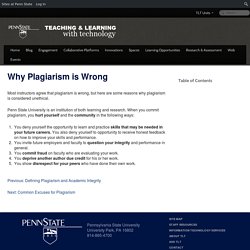
Penn State University is an institution of both learning and research. When you commit plagiarism, you hurt yourself and the community in the following ways: You deny yourself the opportunity to learn and practice skills that may be needed in your future careers. You also deny yourself to opportunity to receive honest feedback on how to improve your skills and performance.You invite future employers and faculty to question your integrity and performance in general.You commit fraud on faculty who are evaluating your work.You deprive another author due credit for his or her work.You show disrespect for your peers who have done their own work.
Real World Examples. Academic Integrity is a serious issue.
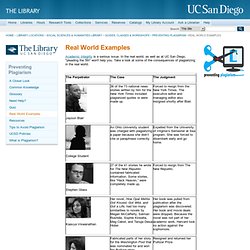
In the real world, as well as at UC San Diego, "pleading the 5th" won't help you. Consequences of Plagiarism. Consequences of Plagiarism It is important to understand that plagiarizing written material serves no purpose other than to detract from the intellectual worth of an assignment, a course, and, ultimately, an education.
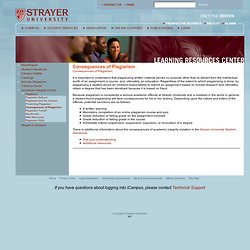
Regardless of the extent to which plagiarizing is done, by plagiarizing a student shuns an inherent responsibility to submit an assignment based on honest research and ultimately obtain a degree that has been devalued because it is based on fraud. Because plagiarism is considered a serious academic offense at Strayer University and a misdeed in the world in general, a student found plagiarizing will face consequences for his or her actions.
Depending upon the nature and extent of the offense, potential sanctions are as follows: Consequences of Academic Misconduct and Plagiarism. Consequences of Academic Misconduct and Plagiarism Consequences of Plagiarism and Academic Dishonesty Plagiarism and academic dishonesty can have some severe penalties and repercussions.
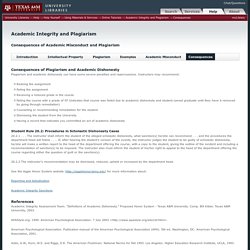
Instructors may recommend: Redoing the assignmentFailing the assignmentReceiving a reduced grade in the courseFailing the course with a grade of XF (indicates that course was failed due to academic dishonesty and student cannot graduate until they have it removed by going through remediation)Counseling or recommending remediation for the studentDismissing the student from the UniversityHaving a record that indicates you committed an act of academic dishonesty Student Rule 20.2: Procedures in Scholastic Dishonesty Cases 20.2.1 . . . 20.2.2 The instructor's recommendation may be dismissed, reduced, upheld or increased by the department head.
See the Aggie Honor System website ( for more information about: ICAI. About Integrity in·teg·ri·ty \in-ˈte-grə-tē\ noun 1. adherence to moral and ethical principles; soundness of moral character; honesty.
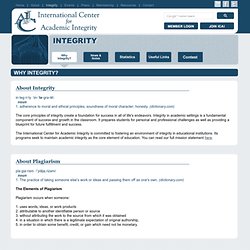
(dictionary.com) 6 Consequences of Plagiarism. The consequences of plagiarism can be personal, professional, ethical, and legal.
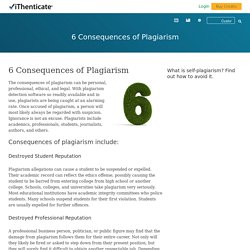
With plagiarism detection software so readily available and in use, plagiarists are being caught at an alarming rate. Once accused of plagiarism, a person will most likely always be regarded with suspicion. Ignorance is not an excuse. Plagiarists include academics, professionals, students, journalists, authors, and others. Facts & Stats — Plagiarism.org. Plagiarism Tutorial: Test Your Knowledge. Plagiarism is a serious academic offense!

The University of Southern Mississippi's undergraduate and graduate bulletins both include statements about plagiarism: "When cheating is discovered, the faculty member may give the student an F on the work involved or in the course. If further disciplinary action is deemed appropriate, the undergraduate student should be reported to the Dean of Students. A graduate student should be reported to the Dean of the Graduate School. "
The news magazine for high school. Citing Sources and Plagiarism. Underlining or Italicizing Titles. Son of Citation Machine. EasyBib: Free Bibliography Maker - MLA, APA, Chicago citation st. CIIA: Teaching and Learning Resources - Copyright and Plagiarism. The Press: cheating ok? Cheating was, is and probably always will be a fact of life.

Recently, technology has provided new ways to cheat, but advanced electronics can't be blamed for our increasing willingness to tolerate it. Once upon a time, being an honorable person included the notion that your word was your bond, and integrity was a crucial element in establishing a good reputation. At least, that was part of the narrative that made up our social compact. My teaching experience tells me, however, that lying and cheating are seen by a lot of kids today as a crucial part of any path to success. The only shame is in getting caught. Students tell me that math is the easiest course in which to cheat because they can program calculators before a test and cheat undetected.
Compounding the problem is the fact that many students aren't fully aware of what constitutes cheating. A few weeks ago, a student took my final exam in the morning and gave the answers to someone who was taking it that afternoon. Son of Citation Machine. Make sure that titles in APA citations are properly capitalized.
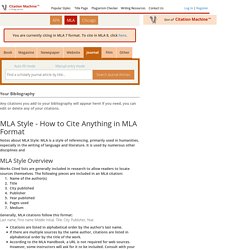
Capitalize only the first letter of the first word or any proper nouns. Notes about MLA Style: MLA is a style of referencing, primarily used in humanities, especially in the writing of language and literature. It is used by numerous other disciplines and MLA Style Overview Works Cited lists are generally included in research to allow readers to locate sources themselves.
How to Paraphrase SLIDE 11. U of Albany When Why Cite. What is Plagiarism?
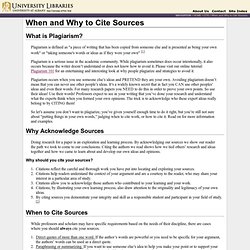
Plagiarism is defined as "a piece of writing that has been copied from someone else and is presented as being your own work" or "taking someone's words or ideas as if they were your own" [1] Plagiarism is a serious issue in the academic community. While plagiarism sometimes does occur intentionally, it also occurs because the writer doesn’t understand or does not know how to avoid it. Please visit our online tutorial: Plagiarism 101 for an entertaining and interesting look at why people plagiarize and strategies to avoid it. Plagiarism occurs when you use someone else’s ideas and PRETEND they are your own. So let’s assume you don’t want to plagiarize, you’ve given yourself enough time to do it right, but you’re still not sure about “putting things in your own words,” judging when to cite work, or how to cite it. Why Acknowledge Sources. Question for Paraphrasing. Plagiarism.
What is Plagiarism and Why is it Important? In college courses, we are continually engaged with other people’s ideas: we read them in texts, hear them in lecture, discuss them in class, and incorporate them into our own writing. As a result, it is very important that we give credit where it is due. Plagiarism is using others’ ideas and words without clearly acknowledging the source of that information.
How Can Students Avoid Plagiarism? To avoid plagiarism, you must give credit whenever you use another person’s idea, opinion, or theory; any facts, statistics, graphs, drawings—any pieces of information—that are not common knowledge; quotations of another person’s actual spoken or written words; or paraphrase of another person’s spoken or written words. These guidelines are taken from the Code of Student Rights, Responsibilities, and Conduct. How to Recognize Unacceptable and Acceptable Paraphrases.
Question for Paraphrasing. SKIP TO SLIDE 31. Question for Slide 31 Forms. 2nd Question for Plag.org. Question for Plag.org.